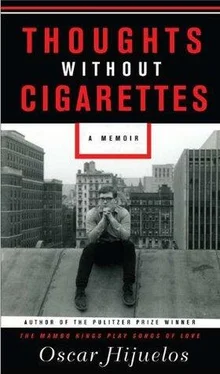After I landed midafternoon in JFK and worked through the traveler’s usual rigmarole, I took a bus back into the city and nearly passed out from how gray and run-down Harlem looked: The same avenue that had so thrilled me as a child upon my release from the hospital, and where I had spent countless afternoons as a teenager shopping or hanging out here or there with my friends, seemed so hopelessly ugly that I quickly started to sink; I’d gotten so used to Roman aesthetics and the tropical colors of that city, the sun-baked crumbling walls and balcony gardens, as well as the Californian/ Mediterranean blueness of its sky, that for the first time in my life, I had some insight into the visual despair that Cubans of my parents’ generation — and for that matter, my exiled cousins — must have experienced as newcomers here. Whatever charms the city had always held for me — and however much I may have fed off the energies and variety of our citizens — would take me months to appreciate again. In the meantime, I felt so glumly disposed that I could hardly believe that not twenty-four hours before, I had been in bed with a remarkably beautiful woman whose spectacular looks, I quickly decided, not a single woman in New York could begin to touch.
It wasn’t just a matter of physicality but of spirit: So many of the faces I glimpsed that day seemed hardened and angry and so generally pissed off at life as to distort even the finest of their features grotesquely. Of course, I was under a spell, unexpectedly missing not just the woman I’d left behind but Italy itself: New York women seemed plain and mean in a way that I had never realized before, an impression that lasted for months, until, of course, I got used to the city again and, making my own inner adjustments, became more and more the dumb shit I had always been. I’d also arrived looking sharper and better-dressed than ever before — a fashion designer, Sojin had done everything in her power to break me of my badly wanting sartorial tastes (okay, if I told you how many people have since looked at me and declared: “But I thought Cubans were supposed to be sharp dressers,” you wouldn’t believe it), though the air of upgrade and refinement I now exuded — and my sudden discomfort over my old surroundings — left me, always the loner, feeling even more estranged, and probably too delicate for that world, as if, in a carryover from my childhood, I had reentered into my Lord Fauntleroy mode, albeit as an adult version.

In my absence, I had rented my apartment to a friend of mine from CCNY. I’d already hooked up with some yuppie willing to fork over almost twice my monthly payments to live there, but when my friend called me up, newly moved out from another place that he shared with a woman and his adopted son, with my own good fortune, I felt so bad for him that I bagged my agreement with the first fellow, throwing some ten or so thousand dollars away in the process. The problem, however, was this: Though I’d written him from Rome that I would be needing my place come the end of April, a date I had arbitrarily chosen and kept pushing forward, and he’d had plenty of notice to leave, when I finally got home, expecting to find my place vacated, I discovered that my friend had hardly packed a toothbrush. In fact, the apartment seemed in a state of chaos, with clothing, boxes, and books and magazines and newspapers strewn about everywhere, but among the things I hadn’t expected to come across were the Black Power and Elijah Muhammad posters he’d plastered on the walls. Additionally, his adopted son, then about six years old and a rather troubled kid, had done a fair job of increasing the local cockroach population by stuffing cookies and other foodstuffs he presumably had never wanted to eat inside my couch, which is to say that my apartment had become infested with them.
But somehow I wasn’t angry or particularly disturbed: My friend, a quite laid-back fellow, seemed hardly bothered by those conditions, and while I felt less than happy to be back in New York, just stepping into my apartment, with its sweeping views of Harlem, seemed to make it easier. Besides, I’d almost learned to relax in Rome — why become an uptight, anxiety- and complaint-ridden New Yorker again, when I had a newly found sense of gusto and (so I thought) savoir faire? Once he’d explained that he had made plans to get everything out that next weekend, I somewhat settled down. He’d already found another place in the neighborhood and just hadn’t gotten his act together: So, everything was cool, right?
Not really. We were on our way out when I asked him if there’d been any mail beyond the occasional batch he’d sent to me in Rome. That’s when he hauled out a box filled with a number of thick TOP PRIORITY envelopes from the IRS and Department of New York State Taxation, some of which were well over a year old; I got a sick feeling seeing them, and maybe it was jet lag, but my stomach went into knots, as it always used to: “How come you didn’t send me these?” I asked him.
“Well,” he said. “I didn’t want you to feel hassled — I mean you were having a good time, right?”
Then I opened one of them: Apparently, I owed quite a lot of money in back taxes. How that happened, I can’t say, but I’d neglected reporting the few grants I’d received in the past, and, it seemed, they’d caught on to me. With penalties, the amount I hadn’t paid them, long since officially delinquent, came out to about eight thousand dollars, as of a month or two before. Having almost nothing to my name, and always stupid about money anyway, I suddenly saw the good deed I’d performed on behalf of my friend in a new light. As I put it to him, incredulously, “Man, I’m fucked,” to which he, no doubt placing my misfortune in the context of the fabulous time I’d probably had, just looked at me and shrugged: “Uh-huh.”

There was something about the threatening tone of those IRS notices that did a number on whatever residual well-being I’d returned with from Italy. Within a week, once I’d gone through what amounted to a hero’s welcome among my old neighborhood friends — as if I’d come back from some distant war — and had on my third day, as if risen from the dead, gone to visit my mother, whom I hadn’t seen in nearly two years, the first thing I thought of as I walked back into that haunted apartment and looked around was, I can’t believe I grew up here — while the first thing she said to me, in apparent delight, was “Hijo! Oh, but what did you bring me?” I decided I had no choice but to try to work something out with the IRS.

I think the office was situated somewhere on Suffolk Street downtown, in a massive but cluttered room filled with some one hundred or so cubicles, each with its own fluorescent lamp overhead, an auditor, and some poor unfortunate turning purple, shaking, voice rising, his life ending, pleading his case. In one of those cubicles, I faced a black woman in a polka-dotted dress and white-frame glasses, somewhere in her mid-fifties, whose eyelids continued to blink unexpectedly, as if the yellowish light in that windowless room hurt her. I had walked in wearing an Italian scarf wrapped about my neck, a fine silk shirt, pleated trousers, and soft leather shoes; sitting down and presenting both my paperwork and my side of the story, all the while trying to impress her with the notion that I was above doing something as tawdry as evading taxes, I must have come off like the biggest fop in the world.
“I really hadn’t anything to do with what happened with those taxes — you see, I was living in Europe for the past year or so, in Rome, in a villa for a good part of that time — studying and writing, in a community of brilliant scholars and artists — and while I was away, I prevailed upon a friend of mine”—her blinking eye did a double take on my use of the word prevail —“to look after my affairs. But you see, my friend seemed to have not thought the papers you sent me too important, and because I had been working on a novel and of course traveling throughout Europe for much of that time, I hardly ever had the opportunity to inquire after such things and. .”
Читать дальше















